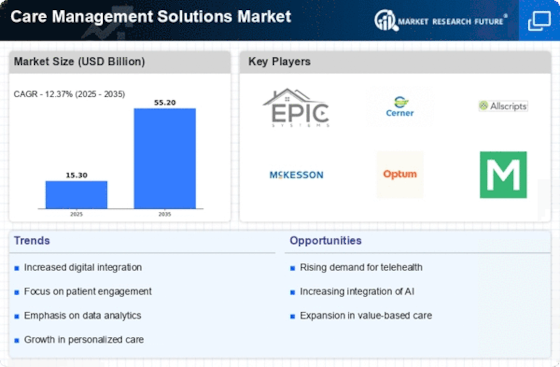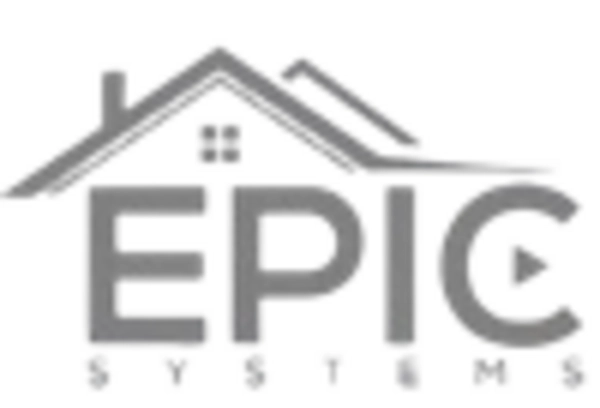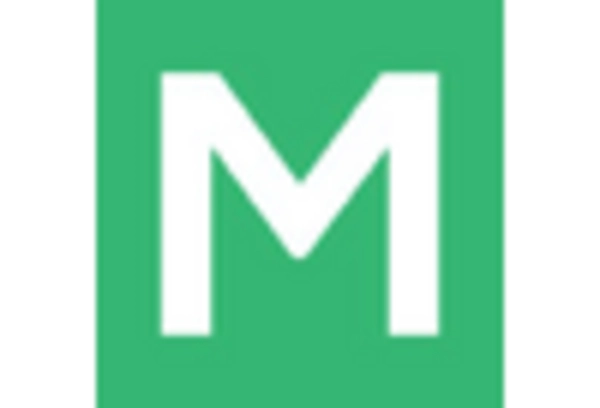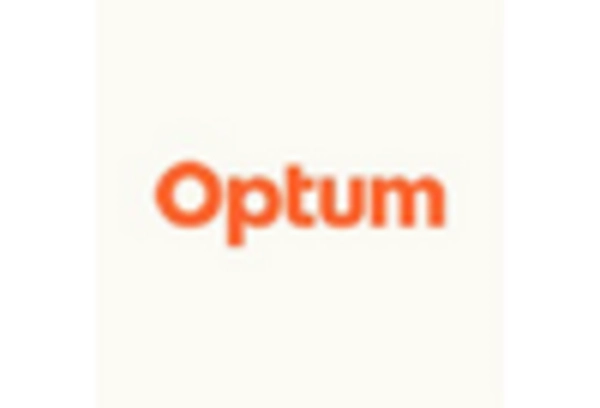Software
Services
Consulting
Training
On-Premise
Cloud-Based
Hybrid
Healthcare Providers
Payers
Government
Chronic Disease Management
Care Coordination
Patient Engagement
North America
Europe
South America
Asia Pacific
Middle East and Africa
North America Outlook (USD Billion, 2019-2035)
Care Management Solutions Market by Solution Type
Software
Services
Consulting
Training
Care Management Solutions Market by Deployment Model Type
On-Premise
Cloud-Based
Hybrid
Care Management Solutions Market by End User Type
Healthcare Providers
Payers
Government
Care Management Solutions Market by Application Type
Chronic Disease Management
Care Coordination
Patient Engagement
Care Management Solutions Market by Regional Type
US
Canada
US Outlook (USD Billion, 2019-2035)
Care Management Solutions Market by Solution Type
Software
Services
Consulting
Training
Care Management Solutions Market by Deployment Model Type
On-Premise
Cloud-Based
Hybrid
Care Management Solutions Market by End User Type
Healthcare Providers
Payers
Government
Care Management Solutions Market by Application Type
Chronic Disease Management
Care Coordination
Patient Engagement
CANADA Outlook (USD Billion, 2019-2035)
Care Management Solutions Market by Solution Type
Software
Services
Consulting
Training
Care Management Solutions Market by Deployment Model Type
On-Premise
Cloud-Based
Hybrid
Care Management Solutions Market by End User Type
Healthcare Providers
Payers
Government
Care Management Solutions Market by Application Type
Chronic Disease Management
Care Coordination
Patient Engagement
Europe Outlook (USD Billion, 2019-2035)
Care Management Solutions Market by Solution Type
Software
Services
Consulting
Training
Care Management Solutions Market by Deployment Model Type
On-Premise
Cloud-Based
Hybrid
Care Management Solutions Market by End User Type
Healthcare Providers
Payers
Government
Care Management Solutions Market by Application Type
Chronic Disease Management
Care Coordination
Patient Engagement
Care Management Solutions Market by Regional Type
Germany
UK
France
Russia
Italy
Spain
Rest of Europe
GERMANY Outlook (USD Billion, 2019-2035)
Care Management Solutions Market by Solution Type
Software
Services
Consulting
Training
Care Management Solutions Market by Deployment Model Type
On-Premise
Cloud-Based
Hybrid
Care Management Solutions Market by End User Type
Healthcare Providers
Payers
Government
Care Management Solutions Market by Application Type
Chronic Disease Management
Care Coordination
Patient Engagement
UK Outlook (USD Billion, 2019-2035)
Care Management Solutions Market by Solution Type
Software
Services
Consulting
Training
Care Management Solutions Market by Deployment Model Type
On-Premise
Cloud-Based
Hybrid
Care Management Solutions Market by End User Type
Healthcare Providers
Payers
Government
Care Management Solutions Market by Application Type
Chronic Disease Management
Care Coordination
Patient Engagement
FRANCE Outlook (USD Billion, 2019-2035)
Care Management Solutions Market by Solution Type
Software
Services
Consulting
Training
Care Management Solutions Market by Deployment Model Type
On-Premise
Cloud-Based
Hybrid
Care Management Solutions Market by End User Type
Healthcare Providers
Payers
Government
Care Management Solutions Market by Application Type
Chronic Disease Management
Care Coordination
Patient Engagement
RUSSIA Outlook (USD Billion, 2019-2035)
Care Management Solutions Market by Solution Type
Software
Services
Consulting
Training
Care Management Solutions Market by Deployment Model Type
On-Premise
Cloud-Based
Hybrid
Care Management Solutions Market by End User Type
Healthcare Providers
Payers
Government
Care Management Solutions Market by Application Type
Chronic Disease Management
Care Coordination
Patient Engagement
ITALY Outlook (USD Billion, 2019-2035)
Care Management Solutions Market by Solution Type
Software
Services
Consulting
Training
Care Management Solutions Market by Deployment Model Type
On-Premise
Cloud-Based
Hybrid
Care Management Solutions Market by End User Type
Healthcare Providers
Payers
Government
Care Management Solutions Market by Application Type
Chronic Disease Management
Care Coordination
Patient Engagement
SPAIN Outlook (USD Billion, 2019-2035)
Care Management Solutions Market by Solution Type
Software
Services
Consulting
Training
Care Management Solutions Market by Deployment Model Type
On-Premise
Cloud-Based
Hybrid
Care Management Solutions Market by End User Type
Healthcare Providers
Payers
Government
Care Management Solutions Market by Application Type
Chronic Disease Management
Care Coordination
Patient Engagement
REST OF EUROPE Outlook (USD Billion, 2019-2035)
Care Management Solutions Market by Solution Type
Software
Services
Consulting
Training
Care Management Solutions Market by Deployment Model Type
On-Premise
Cloud-Based
Hybrid
Care Management Solutions Market by End User Type
Healthcare Providers
Payers
Government
Care Management Solutions Market by Application Type
Chronic Disease Management
Care Coordination
Patient Engagement
APAC Outlook (USD Billion, 2019-2035)
Care Management Solutions Market by Solution Type
Software
Services
Consulting
Training
Care Management Solutions Market by Deployment Model Type
On-Premise
Cloud-Based
Hybrid
Care Management Solutions Market by End User Type
Healthcare Providers
Payers
Government
Care Management Solutions Market by Application Type
Chronic Disease Management
Care Coordination
Patient Engagement
Care Management Solutions Market by Regional Type
China
India
Japan
South Korea
Malaysia
Thailand
Indonesia
Rest of APAC
CHINA Outlook (USD Billion, 2019-2035)
Care Management Solutions Market by Solution Type
Software
Services
Consulting
Training
Care Management Solutions Market by Deployment Model Type
On-Premise
Cloud-Based
Hybrid
Care Management Solutions Market by End User Type
Healthcare Providers
Payers
Government
Care Management Solutions Market by Application Type
Chronic Disease Management
Care Coordination
Patient Engagement
INDIA Outlook (USD Billion, 2019-2035)
Care Management Solutions Market by Solution Type
Software
Services
Consulting
Training
Care Management Solutions Market by Deployment Model Type
On-Premise
Cloud-Based
Hybrid
Care Management Solutions Market by End User Type
Healthcare Providers
Payers
Government
Care Management Solutions Market by Application Type
Chronic Disease Management
Care Coordination
Patient Engagement
JAPAN Outlook (USD Billion, 2019-2035)
Care Management Solutions Market by Solution Type
Software
Services
Consulting
Training
Care Management Solutions Market by Deployment Model Type
On-Premise
Cloud-Based
Hybrid
Care Management Solutions Market by End User Type
Healthcare Providers
Payers
Government
Care Management Solutions Market by Application Type
Chronic Disease Management
Care Coordination
Patient Engagement
SOUTH KOREA Outlook (USD Billion, 2019-2035)
Care Management Solutions Market by Solution Type
Software
Services
Consulting
Training
Care Management Solutions Market by Deployment Model Type
On-Premise
Cloud-Based
Hybrid
Care Management Solutions Market by End User Type
Healthcare Providers
Payers
Government
Care Management Solutions Market by Application Type
Chronic Disease Management
Care Coordination
Patient Engagement
MALAYSIA Outlook (USD Billion, 2019-2035)
Care Management Solutions Market by Solution Type
Software
Services
Consulting
Training
Care Management Solutions Market by Deployment Model Type
On-Premise
Cloud-Based
Hybrid
Care Management Solutions Market by End User Type
Healthcare Providers
Payers
Government
Care Management Solutions Market by Application Type
Chronic Disease Management
Care Coordination
Patient Engagement
THAILAND Outlook (USD Billion, 2019-2035)
Care Management Solutions Market by Solution Type
Software
Services
Consulting
Training
Care Management Solutions Market by Deployment Model Type
On-Premise
Cloud-Based
Hybrid
Care Management Solutions Market by End User Type
Healthcare Providers
Payers
Government
Care Management Solutions Market by Application Type
Chronic Disease Management
Care Coordination
Patient Engagement
INDONESIA Outlook (USD Billion, 2019-2035)
Care Management Solutions Market by Solution Type
Software
Services
Consulting
Training
Care Management Solutions Market by Deployment Model Type
On-Premise
Cloud-Based
Hybrid
Care Management Solutions Market by End User Type
Healthcare Providers
Payers
Government
Care Management Solutions Market by Application Type
Chronic Disease Management
Care Coordination
Patient Engagement
REST OF APAC Outlook (USD Billion, 2019-2035)
Care Management Solutions Market by Solution Type
Software
Services
Consulting
Training
Care Management Solutions Market by Deployment Model Type
On-Premise
Cloud-Based
Hybrid
Care Management Solutions Market by End User Type
Healthcare Providers
Payers
Government
Care Management Solutions Market by Application Type
Chronic Disease Management
Care Coordination
Patient Engagement
South America Outlook (USD Billion, 2019-2035)
Care Management Solutions Market by Solution Type
Software
Services
Consulting
Training
Care Management Solutions Market by Deployment Model Type
On-Premise
Cloud-Based
Hybrid
Care Management Solutions Market by End User Type
Healthcare Providers
Payers
Government
Care Management Solutions Market by Application Type
Chronic Disease Management
Care Coordination
Patient Engagement
Care Management Solutions Market by Regional Type
Brazil
Mexico
Argentina
Rest of South America
BRAZIL Outlook (USD Billion, 2019-2035)
Care Management Solutions Market by Solution Type
Software
Services
Consulting
Training
Care Management Solutions Market by Deployment Model Type
On-Premise
Cloud-Based
Hybrid
Care Management Solutions Market by End User Type
Healthcare Providers
Payers
Government
Care Management Solutions Market by Application Type
Chronic Disease Management
Care Coordination
Patient Engagement
MEXICO Outlook (USD Billion, 2019-2035)
Care Management Solutions Market by Solution Type
Software
Services
Consulting
Training
Care Management Solutions Market by Deployment Model Type
On-Premise
Cloud-Based
Hybrid
Care Management Solutions Market by End User Type
Healthcare Providers
Payers
Government
Care Management Solutions Market by Application Type
Chronic Disease Management
Care Coordination
Patient Engagement
ARGENTINA Outlook (USD Billion, 2019-2035)
Care Management Solutions Market by Solution Type
Software
Services
Consulting
Training
Care Management Solutions Market by Deployment Model Type
On-Premise
Cloud-Based
Hybrid
Care Management Solutions Market by End User Type
Healthcare Providers
Payers
Government
Care Management Solutions Market by Application Type
Chronic Disease Management
Care Coordination
Patient Engagement
REST OF SOUTH AMERICA Outlook (USD Billion, 2019-2035)
Care Management Solutions Market by Solution Type
Software
Services
Consulting
Training
Care Management Solutions Market by Deployment Model Type
On-Premise
Cloud-Based
Hybrid
Care Management Solutions Market by End User Type
Healthcare Providers
Payers
Government
Care Management Solutions Market by Application Type
Chronic Disease Management
Care Coordination
Patient Engagement
MEA Outlook (USD Billion, 2019-2035)
Care Management Solutions Market by Solution Type
Software
Services
Consulting
Training
Care Management Solutions Market by Deployment Model Type
On-Premise
Cloud-Based
Hybrid
Care Management Solutions Market by End User Type
Healthcare Providers
Payers
Government
Care Management Solutions Market by Application Type
Chronic Disease Management
Care Coordination
Patient Engagement
Care Management Solutions Market by Regional Type
GCC Countries
South Africa
Rest of MEA
GCC COUNTRIES Outlook (USD Billion, 2019-2035)
Care Management Solutions Market by Solution Type
Software
Services
Consulting
Training
Care Management Solutions Market by Deployment Model Type
On-Premise
Cloud-Based
Hybrid
Care Management Solutions Market by End User Type
Healthcare Providers
Payers
Government
Care Management Solutions Market by Application Type
Chronic Disease Management
Care Coordination
Patient Engagement
SOUTH AFRICA Outlook (USD Billion, 2019-2035)
Care Management Solutions Market by Solution Type
Software
Services
Consulting
Training
Care Management Solutions Market by Deployment Model Type
On-Premise
Cloud-Based
Hybrid
Care Management Solutions Market by End User Type
Healthcare Providers
Payers
Government
Care Management Solutions Market by Application Type
Chronic Disease Management
Care Coordination
Patient Engagement
REST OF MEA Outlook (USD Billion, 2019-2035)
Care Management Solutions Market by Solution Type
Software
Services
Consulting
Training
Care Management Solutions Market by Deployment Model Type
On-Premise
Cloud-Based
Hybrid
Care Management Solutions Market by End User Type
Healthcare Providers
Payers
Government
Care Management Solutions Market by Application Type
Chronic Disease Management
Care Coordination
Patient Engagement


















Leave a Comment